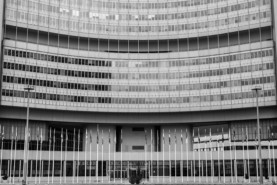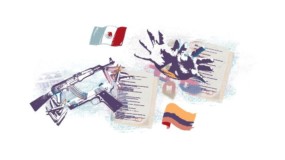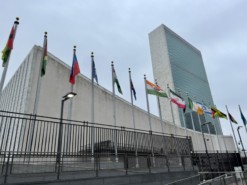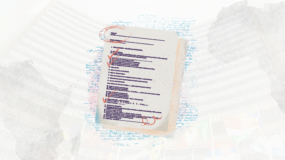Posted on 17 Jan 2023
Vienna delegates to the UN Office on Drugs and Crime (UNODC) wrapped up 2022 with a focus on governance and criminal justice issues. A packed agenda for civil society engagement in these processes awaits in 2023.
In May 2021, following the UN Crime Congress in Kyoto, the Commission on Crime Prevention and Criminal Justice (CCPCJ) passed a resolution to adopt the Kyoto Declaration and a work plan of thematic discussions on the declaration’s key topics. In line with this work plan, in December 2022, the CCPCJ held a set of follow-up thematic discussions. In addition, the CCPCJ and the Commission on Narcotic Drugs (CND) – the governing bodies of the UNODC – reconvened their annual sessions to look at budgetary and administrative issues.
Thematic discussions on criminal justice
The focus of the CCPCJ’s December thematic discussion was ‘advancing the criminal justice system’ – the second pillar of the Kyoto Declaration. This followed a discussion in November 2021 on the first pillar, ‘advancing crime prevention’. The December discussions were divided into different issues each day, with speakers predominantly from governments and the UNODC, and some from civil society.
During the first day, participants discussed how to better safeguard victims’ rights, protect witnesses and reporting persons and improve criminal investigation processes. Protecting witnesses and whistle-blowers is key in addressing transnational organized crime, as enshrined in the UN Convention against Transnational Organized Crime (UNTOC). Discussions emphasized victim-centred approaches, and speakers stressed the importance of listening to victims, respecting their dignity in the justice process and breaking silos through multidisciplinary and sectoral responses. Although discussions did not focus on organized crime, a UNODC speaker categorized corruption as a non-violent crime and an enabler for organized crime, and a speaker from the Austrian Witness Protection Unit described witness protection as a robust measure for countering organized crime. However, there was little debate on the inadequacies of witness protection schemes worldwide, despite the obligations and commitments of the UNTOC and the UN Convention against Corruption (UNCAC).
On the second day, the focus was on improving prison conditions and reducing reoffending through rehabilitation and reintegration. Prison conditions are linked to the ability of organized crime to operate and recruit. A priority issue that emerged from the discussions is the overcrowding of prisons, and participants agreed that the root causes need to be addressed by reducing the scope of imprisonment, bettering prison conditions and ensuring the reintegration of offenders. Speakers emphasized that efforts to address reoffending require a whole of government and society approach. A speaker from the UNODC noted the need to partner with the media and civil society to be more transparent about prison management, and a representative from the NGO Mexico Institute highlighted the consequences of poor prison conditions on inmates and the role civil society can play in advocating for change. Regarding the ability of organized crime to operate in and from prisons, a representative of the US State Department identified prisons as a recruiting ground for organized crime.
On the last day, speakers explored how to mainstream a gender perspective into criminal justice systems and how to address the vulnerabilities of children and youth in contact with such systems. Gender perspectives are increasingly recognized in the formulation of transnational organized crime policies. The negative impact of COVID-19 on gender-based violence emerged as a key theme, along with the effects of intersectional factors on criminal justice. The importance of multi-stakeholder cooperation was also highlighted, including by the vice president of the International Association of Anti-Corruption Authorities. A UNODC representative spoke of the diversity of civil society actors engaged in gender issues, and the importance of psychosocial support and mental health. The civil society organization Persons Against Non-State Torture referred to torture as a crime that is effectively state-centred and advocated for the recognition of private actors as perpetrators, particularly regarding violence against women. Meanwhile, a speaker from Honduras highlighted that organized criminal violence in the form of torture requires a radical response, especially in instances of gang violence against women.
Avenues for civil society engagement
The December meetings ended with the annual joint session of the CCPCJ and the CND. Although discussions focused on financial and governance issues for the commissions and the UNODC, there were opportunities to highlight the importance of civil society engagement. The EU speaker reinforced civil society’s participation in UN work and the importance of learning from their experiences. He also condemned the attempts to exclude NGOs from participation in UNODC processes this year. A US representative commended the work of civil society in the UNODC’s work, and an Australian speaker encouraged working with civil society to identify barriers to work.
In addition, a Paraguay representative sought effective responses to prevent and address organized crime and corruption; Pakistan mentioned the trafficking of illicit drugs in Afghanistan and the rise in meth in neighbouring countries as prevalent organized crimes; and Syria highlighted links between crime, transnational organized crime and terrorism.
Although member states led the CCPCJ discussions, there were some civil society-led engagements in the margins. A joint event by the Global Initiative Against Transnational Organized Crime, the NGO Alliance and the UNODC Civil Society Unit focused on the ongoing negotiations towards a new UN treaty to counter the use of ICT for criminal purposes, and the challenges in ensuring an open and consultative process as the negotiations move forward. A civil society consultation on strengthening the implementation of the UNODC Synthetic Drug Strategy 2021–2025 provided another opportunity for engagement.
The ongoing process to evaluate the Kyoto Declaration’s implementation provides opportunities for multisectoral engagement, which is much needed when discussing the intersection of organized crime, human rights, sustainable development and the rule of law. In consulting on governance and finance issues, some UN member states emphasized the need for such engagement with civil society to implement the UNODC’s mandates. There are a number of opportunities for civil society engagement on the agenda in 2023 – in particular, the cybercrime treaty negotiations, the next round of constructive dialogues for the implementation of the UNTOC, the annual CND and CCPCJ meetings and the UNCAC Conference of States Parties. Member states and civil society stakeholders should prepare and coordinate to make the most of these opportunities.



